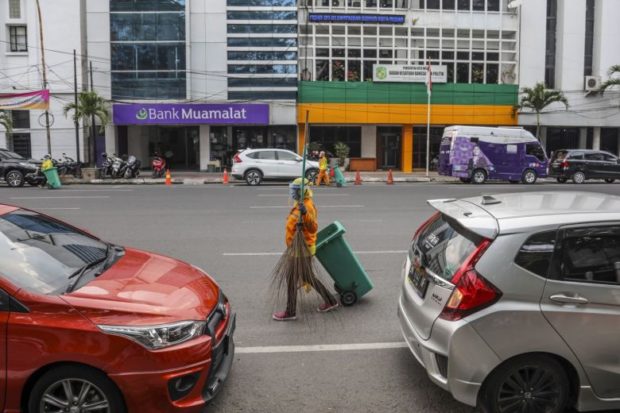IMF revises growth rate for Singapore and Asean’s top economies downwards to -1.3% due to coronavirus disruption

A cleaner wearing a protective face shield cleans up the street in Medan, North Sumatra, Indonesia, on April 15, 2020. PHOTO: EPA-EFE via The Straits Times/Asia News Network
WASHINGTON — The International Monetary Fund (IMF) on Wednesday (April 15) revised down the growth rate in 2020 of the Asean-5 countries – Indonesia, Malaysia, Philippines, Singapore, and Thailand – to minus 1.3 percent.
“Large Asean countries have introduced public health measures including lockdowns, and there are negative economic impacts from reduced tourism, disrupted trade and manufacturing, and the spillovers from financial markets,” Mr Changyong Rhee, the director of the Asia and Pacific Department at the IMF, said in a virtual press conference.
Thailand, badly hit by a tourism crash, will see negative 6.7 per cent growth, he said.
“For the frontier economies (such as Cambodia, Lao, Myanmar and Vietnam), their export and tourism-driven economies are likely to be significantly disrupted by the global spread of the virus even though they seem to be at the beginning of the epidemic curve,” Mr Rhee said.
In terms of the response, Singapore’s expansionary fiscal policy is unprecedented, but it is an unprecedented time and it is unavoidable, he said.
Article continues after this advertisement“This is an unprecedented time,” Mr Rhee said. “And this 12 percent is in line and even at the lower end of what Europe and even the US is currently doing. ”
Article continues after this advertisementIt is “lucky” that Singapore has been able to do this thanks to its conservative policies in the past, Mr Rhee said.
The slowdown in advanced economies is much more severe, with Asia’s key trading partners expected to contract sharply, including the US by -5.9 percent and Euro Area by -7.5 percent, Mr Rhee said.
Japan’s economic outlook for 2020 has deteriorated significantly, with real GDP expected to decline by 5.2 per cent.
While China’s economy is beginning to get back to work, other economies are imposing tighter lockdowns, and some are experiencing a second wave of virus infections.
“China is expected to grow by 1.2 percent in 2020,” he said. “We expect a rebound in economic activity later this year. This is because China is emerging from the outbreak first. Nonetheless, there are clear risks: the virus could come back and normalization could take longer.”
Korea is anticipated to have negative 1.2 percent growth, Mr Rhee said. “The negative impact on growth is expected to be smaller than in most other advanced economies, reflecting effective strategy to flatten the infection curve, which has avoided major production shutdowns in manufacturing and services.”
India’s growth has been revised down to 1.9 percent for fiscal year 2020, Mr Rhee said, as India entered the pandemic turmoil in the midst of a credit crunch induced slowdown and its recovery prospects have become more uncertain.
“Despite the economic slowdown, the government implemented a national wide lockdown and we support India’s proactive decision,” Mr Rhee said.
Despite the negative outlook, however, Asia’s growth still fares better than other regions, Mr Rhee said.
“For 2021, there is hope: if containment policies succeed, we will see a rebound in growth.”
“This is not a time for business as usual. Asian countries need to use all policy instruments in their toolkits. In doing so, policy tradeoffs will be inevitable and will depend on policy space,” he said.
“The first priority is to support and protect the health sector to contain the virus and introduce measures that slow contagion,” he said. “If there is not enough fiscal space, countries will need to re-prioritize from other expenditures.”
“Containment measures are severely affecting economies. Targeted support to hardest-hit households and firms is needed. This is a real economic shock unlike the Global Financial Crisis. Protect people, jobs and industries directly, not just through financial institutions,” Mr Rhee said in his policy recommendations.
“The pandemic is also affecting financial market functioning. Use monetary and macroprudential regulations flexibly to provide ample liquidity, (and) ease financial stress of industries and SMEs (small and medium scale enterprises).”
“For emerging markets with limited fiscal space, they might need to consider how to use central bank balance sheets flexibly to help SMEs through risk-sharing with the government,” Mr Rhee said.
“External pressures need to be contained. Countries should seek and utilize bilateral and multilateral swap lines and financial support from multilateral institutions,” he stressed.
“There can be a role for capital flow measures to secure external sector stability as a prerequisite to use more aggressive domestic policies to prevent lasting social and economic distress.”
“Targeted support combined with domestic demand stimulus in a recovery will help to reduce scarring, but it needs to reach people and smaller firms,” he said.
For more news about the novel coronavirus click here.
What you need to know about Coronavirus.
For more information on COVID-19, call the DOH Hotline: (02) 86517800 local 1149/1150.
The Inquirer Foundation supports our healthcare frontliners and is still accepting cash donations to be deposited at Banco de Oro (BDO) current account #007960018860 or donate through PayMaya using this link.